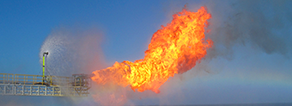Shares of troubled West of Shetland oil and gas explorer Hurricane Energy plc fell another 50% on Friday after it slashed its reserve estimates for its oil projects in the West of Shetland area.
In a stock exchange statement, Hurricane revealed that the early production system (EPS) on the firm’s Lancaster field is now expected to produce 16 million barrels of oil in total — with 9.4 million barrels remaining.
Hurricane had expected to retrieve 37.3 million barrels of oil from the EPS over six years and a potential 62 million barrels through a four-year extension.
Remaining contingent resources from Lancaster have been reduced to 58 million barrels. A report from RPS Energy had estimated the field had 486 million.
The nearby Lincoln field is now thought to hold contingent resources of 45 million barrels — compared to the 565 million barrels in the RPS Energy report.
Hurricane’s technical review has not included assessments of the Warwick and Halifax fields, but downgrades are now likely for both.
Hurricane Energy chairman Steven McTiernan said: “2020 is proving to be a hugely challenging year for Hurricane.
“We have had to contend with not only a significant fall in oil prices and the effects of the COVID-19 pandemic, but also poorer than expected reservoir performance from the Lancaster EPS.
“The EPS was always intended as a long-term production test to establish the size and production characteristics of this unique and pioneering basement play.
“Basement reservoirs are subject to profound technical risks, with difficult well conditions impacting the effectiveness of evaluation tools, creating uncertainties which can only be resolved by observation of actual production performance.
“It is nonetheless disappointing that the Technical Review has so far resulted in significant reductions in reserves and resources.
“On a more optimistic note, initial studies suggest water injection could partially mitigate the reserves downgrade, and onlapping sandstones at Lancaster could represent material upside potential.”
Antony Maris, chief executive officer designate of Hurricane, said: “Following the uncertainty of recent months, as the significance of the EPS reservoir performance has become clearer, we must now focus on extracting value from Lancaster and our other discoveries, while optimising the use of our significant installed infrastructure West of Shetland.
“In particular, the Technical Review has identified upside within sandstone reservoirs on the flanks of the Lancaster field, with the potential for volumes of recoverable oil which are significant in a UKCS context.
“Furthermore, together with Spirit, we are working towards consideration of a viable development plan for the Lincoln field.
“Our near-term priority is further technical work to refine an activity plan for Lancaster, which we expect to be finalised by the end of this year and executed in 2021, with an overarching focus on capital discipline.
“We will be engaging with all our key stakeholders regarding our forward work programme and financing arrangements and updating the market on these efforts in due course.”
Hurricane also published half-year results for the period ended June 30, 2020, with revenues of $81.9 million “from seven liftings of Lancaster crude” — a big jump from the $22.5 million reported for the same period of 2019.
Loss after tax for the period was $307.7 million (H1 2019: Loss of $21.4 million), including $238.9 million (H1 2019: $nil) “relating to the impairment of the Lancaster field and a $34 million credit (H1 2019 : $23.5 million charge) in relation to the fair value of the Convertible Bond.”
